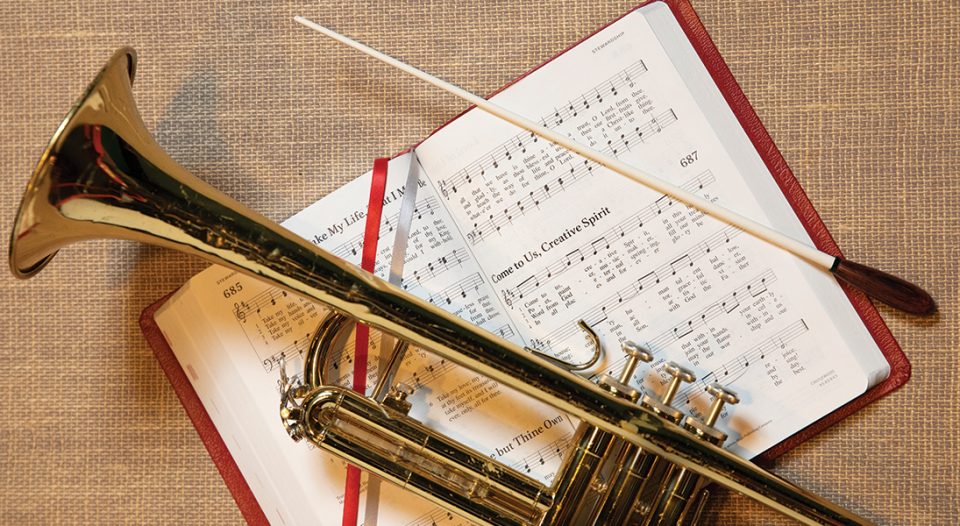In March, Living Lutheran ran a call for creatives on the ELCA’s Facebook page that was flooded with responses. Some of those creatives are featured here—others will be featured in the future.
Faith, writes Martin Luther in his introduction to Romans, is a creative and powerful thing. And, as Lutherans everywhere show, creativity is a powerful demonstration of faith.
“Everybody has creative sensibilities,” said Joe Davis, a Minneapolis-based Lutheran poet and musician. “God created us, and we’re creative beings, therefore we have a creative spark within us. It manifests in different ways in everyone. We’re makers of things.”
Here are the stories of six remarkably creative ELCA members. They use their talents to craft poetry, podcasts, art or music.
Whether their work is showcased inside or outside the walls of a church, their creativity is guided by their faith. And that’s a powerful thing.
Joe Davis, poet
Davis’ creativity has the power to bring people together.
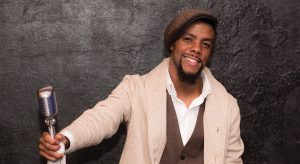
Photo: @elliotmalchemist
Flanked by his band, The Poetic Diaspora—a soul and funk group that gives melody and rhythm to his spoken-word poetry—Davis gazes out at the crowd. He wants to get them on their feet. He wants them linking arms. And he wants them singing, shouting and clapping.
These actions exemplify the world we want
to see, Davis said, adding, “People of diverse cultures and ages making music together—it’s a beautiful thing.”
Part wordsmith, musician, educator and activist, Davis examines faith, love, race and community in his poetry. He sees his art as part of a tradition tracing through the eras of slavery and the civil rights movement.
“Music and poetry have always given people this resilience and have been able to inspire new hope when they couldn’t otherwise see any,” he said.
Davis took up poetry at an early age, writing love notes on the playground. He studied English at Minot (N.D.) State University, where he forged a close relationship with the Lutheran campus pastor. Although Davis grew up in the Pentecostal church, in college he “delved more deeply into [Lutheran] theology,” he said. “It really resonated with what I believe to be true.”
After graduating, Davis was hired as the artist-in-residence at Redeemer Lutheran Church, Minneapolis, and began performing poetry. Friends would gather in his living room to play music, and after he invited them to join him on stage once, Joe Davis & The Poetic Diaspora was born.
In addition to serving as frontman for that band, Davis tours with Lutheran hip-hop artist AGAPE* and leads arts workshops in schools. He’s editor of “Poetry Behind the Walls,” a book series by incarcerated youth, and helped launch Behind the Blue Line, a storytelling project honoring local victims of police brutality.
As he finishes a master’s degree in theology at Luther Seminary, St. Paul, Minn., Davis plans to continue devoting his life to faith-infused art. There’s no better way, he said, to bring people together. “That’s my driving inspiration, to make people feel and know that they’re beloved children of God,” Davis said. “And there’s nothing they can say or do to change that.”
Sarah Rhea Werner, writer
Werner’s creativity has the power to inspire people to write.

Photo: Courtesy of Sarah Rhea Werner
The Sioux Falls, S.D.,-based writer has always been passionate about storytelling. But once she began writing about writing, she had an epiphany.
“My life just became so joyous and rich,” Werner said. “If you’re called to do something, if you’re made to do something, you should probably do it.”
An English major at Valparaiso (Ind.) University, Werner had originally planned on going to graduate school. But she graduated as the Great Recession hit and decided to pursue marketing work instead.
While she was initially excited about a gig that allowed her to write for a living, Werner eventually felt unfulfilled. Forming a local writers’ group reinvigorated her desire to write for fun. She started blogging about the act of writing, though she wasn’t sure she had any readers.
A friend pointed out that in the emerging market of podcasting, there were few female hosts and shows about writing. So Werner set up a makeshift studio at home, started recording episodes and quickly developed an audience. Many listeners were just like her—people who wanted to be writing more.
“Often people struggle with writing because at some point they’ve been told they’re no good at it, or they’re not as good as somebody else, or writing was taught to be a chore,” she said. “What’s important, what’s healthy for you and fulfilling, is the act of creation itself.”
Since launching the Write Now podcast in 2014, her show averages 5,000 listeners per episode and has more than 500,000 total downloads.
In 2017, Werner merged her passion for creative writing and podcasting by launching an episodic audio drama, “Girl in Space.” Midway through its first season, the sci-fi podcast has 30,000 regular listeners.
For Werner, a member of Spirit of Joy Lutheran Church in Sioux Falls, rediscovering her vocation reminds her of the parable of the talents—what were you given, and are you spending it wisely or burying it?
“We’re made in God’s image, and God is the ultimate creator,” she said. “We were put here to continue his work, and that’s not only loving other people and caring for the poor, but it’s also to be here creating things. It makes the world a better place.”
Marc Eric Gulsrud, artist
Gulsrud’s creativity has the power to transform light.
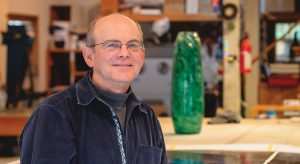
Photo: Kendra Roelle
Gulsrud’s work designing stained glass spans nearly four decades. He has designed windows for more than 300 churches across the country and in western Europe, nearly 200 of which have been for ELCA congregations.
“Glass is such a luscious material. It’s always changing with the light and weather, the time of day, the time of year,” the Tacoma, Wash., based-artist said. Hundreds of years ago people saw the interplay between light and stained glass as a metaphor for the way “God’s grace passes through us to create something really beautiful,” he said. “And that’s still true.”
Gulsrud grew up in Santa Monica, Calif., with nearby Hollywood fostering dreams of becoming an animator. As a child he drew constantly, then gradually got into painting. After graduating from California Lutheran University in Thousand Oaks, Gulsrud worked in Holland creating ceramics and sculptures.
He eventually moved back to Los Angeles to work as a mixed media artist. In 1980 a pastor from his childhood congregation asked him if he could turn some of his paintings into stained-glass windows.
While he never had formal training in stained glass, Gulsrud learned the craft hands-on through artist connections. Word of his talents spread quickly through Lutheran circles, and the work soon became reliable income.
“I really feel like God gave me a gift and I’m meant to pursue it, which is certainly very fortunate,” said Gulsrud, a member of St. Mark Lutheran Church by the Narrows in Tacoma.
Gulsrud doesn’t depict biblical scenes in his stained glass, instead using a more abstract style that leaves interpretation up to the viewer. Drawing on themes of creation and light as God’s presence, his work aims to create a unified, prayerful mood throughout a church.
Over the years, he has created stained glass for skyscrapers and other glass-based art for a variety of buildings. But the significance of the work he does in sanctuaries is never lost on him. “Liturgical work is what’s fulfilling to me,” he said. “I just feel like it really enhances people’s lives. It has a strong impact on them, especially in … worship and healing and personal growth.”
Jeanne Dittmann, calligrapher
Dittmann’s creativity has the power to make people see words in new way
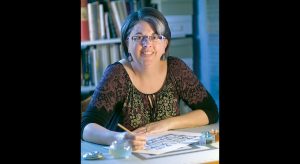
Photo: Andrew Dittma
Any word, when spoken or read often enough, can begin to lose meaning. But through lines and colors drawn by a skilled calligrapher, that word becomes art, prompting reflection.
“There are letters all around us,” said Dittmann, a professional calligrapher in Waco, Texas, for 23 years. “The more you start looking at them and studying them, you start thinking about what makes them beautiful, and how you can create or change it to make it into something different.”
Using a range of tools—walnut ink, broad-edged pens, pointed brushes and pens handmade from soda cans—Dittmann draws Bible verses, inspirational phrases and more for commission or to display in her congregation, St. Matthew Lutheran in Waco.
She bought her first pen set in fifth grade, but she didn’t get serious about calligraphy until she took recreational classes in the Chicago suburbs after she earned bachelor’s and master’s degrees.
When her family moved to Texas, she started her business as a creative outlet and to earn extra income while she raised two children.
Over the years, Dittmann has made art for homes and institutions. She also helped grow the area calligraphy guild. Many of her pieces, which she regularly shares on Instagram, are full of vibrant color and bold lines.
“The creativity is how each letter is relating to the letter next to it,” she said, “and making even small adjustments to each letter because of the other letters around it.”
Dittmann also shares her talents through the arts ministry at St. Matthew. For eight years, they’ve been inspiring members to find the creativity within themselves and display their work in an annual exhibit titled “Art as Worship.”
For Dittmann, faith and art are intertwined. As someone who finds doodling helps her stay focused, she often takes a pencil from her pew and picks a word from the week’s Bible readings or sermon to draw in her bulletin during worship.
“I just love letters, the shapes of them and that, depending on how you write those letters, you can communicate so much above and beyond the words themselves,” she said. “That, to me, is what’s so beautiful about the art form.”
Jon Ailabouni, composer
Ailabouni’s creativity has the power to change the way people worship.
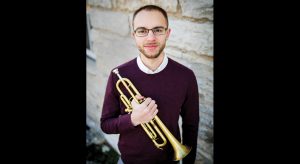
Photo: Courtesy of Jon Ailabouni
A lifelong Lutheran and longtime trumpet player, Ailabouni became obsessed with jazz as his music career advanced. It was only a matter of time before he found a way to incorporate his passion into worship.
Certainly, hearing “Praise God, from Whom All Blessings Flow” played with an Afro-Cuban beat makes for a unique listening experience. But for Ailabouni, jazz in worship means more: it’s about bringing the spirit of the genre—the perpetual creativity of improvisation—into the traditional setting of a sanctuary.
“Those qualities that jazz musicians rely on to make good music in the moment are the same qualities that those of us are trying to live in a Christian community,” he said. “You need all different sorts of backgrounds and perspectives and identities, and then you have to come together.”
Ailabouni is an adjunct music professor and jazz band director at Luther College in Decorah, Iowa, and performs in a jazz duo. He fell in love with jazz as a Luther undergraduate, and then began composing music while earning a master’s degree at Western Michigan University in Kalamazoo.
The incubator for his jazz-in-worship ideas was Lutheran Church of the Atonement, Barrington, Ill., where his father, a Palestinian who emigrated to America at age 19, is pastor and his mother is music director.
Over the past 10 years, Ailabouni has written full jazz liturgies, composed original music, and has adapted classic jazz compositions by Duke Ellington, John Coltrane and other icons for worship.
“Jazz has a rich spirituality embedded in the music,” he said. “It moves me spiritually. I see it as a way to engage … some of the deepest and most powerful expressions of the black American experience.”
Ailabouni never wants jazz to feel like a gimmick. Before developing a piece or service, he works with a pastor or music director to marry the style with songs and themes to enhance the message.
For Ailabouni, every performance is an opportunity to help people connect with their spirituality. “I’m fascinated by the qualities, like compassion and vulnerability, that get expressed through music,” he said. “I’m trying to live out those qualities, which Jesus was an example for.”
Yabetza Vivas Irizarry, musician
Vivas Irizarry’s creativity has the power to bridge cultures.
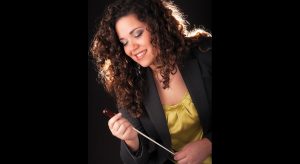
Photo: Courtesy of Yabetza Vivas Irizarry
A native of Puerto Rico now living in Michigan, Vivas Irizarry knows what it’s like to attend worship and not recognize the music. But all it takes is one familiar tune to send a wave of acceptance and love rushing through her.
“There are people in our communities who, by not acknowledging their existence, we’re denying them,” she said. “When I go to church and they’re singing a song that I recognize, I feel welcomed. That’s embodying what the kingdom of God is all about.”
Since 2010, she’s been a musician with the ELCA’s Glocal Mission Gatherings, which offer practical training for mission work while highlighting connections between local and global outreach. Vivas Irizarry sings and plays a variety of instruments—percussion, guitar, bass, occasionally piano—and helps coordinate the group’s music.
The group studies the philosophy behind each style of music, practices the language it’s sung in and learns about the associated culture. Wherever they perform, they’re helping build cultural understanding and more inclusive worship communities. “That’s at the root of what Glocal is—how we can, through music, accompany each other,” she said.
Growing up Lutheran in Puerto Rico, it wasn’t unusual for worship to feature organ for one hymn, then salsa music for the next. Vivas Irizarry was part of it, playing instruments or singing.
When she went to college, however, she studied mechanical engineering. Two years in, she realized it wasn’t a fit and transferred to the Puerto Rico Conservatory of Music in San Juan.
Now, as she finishes a master’s degree at Eastern Michigan University, Ypsilanti, Vivas Irizarry hopes to start a nonprofit in Puerto Rico to support research on the country’s music, while finding new ways to incorporate it in education and worship.
“Music brings unity,” she said. “In church, it can be how you feel God. It’s not just about a sound, it’s about who you are in the midst of your culture.”



